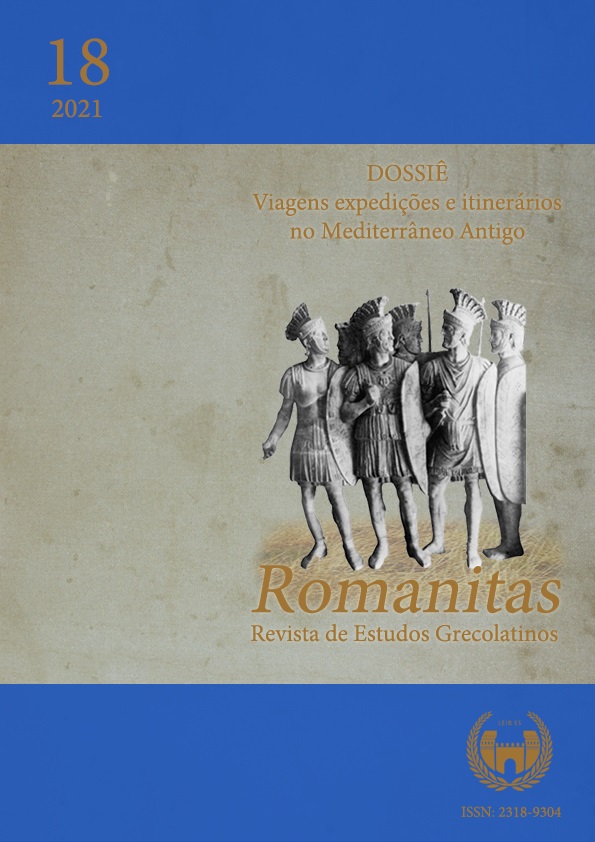A viagem do exército de Nabucodonosor em 'Judite' e a sua relevância na literatura judaica helenística
DOI:
https://doi.org/10.17648/rom.v0i18.36710Palavras-chave:
Judite, Literatura global, Judeus, Impérios antigosResumo
O Livro de Judite (134-76 A.E.C.), texto apócrifo do Antigo Testamento, escrito em grego koiné, tem atraído a atenção de pesquisadores do judaísmo antigo pelo protagonismo da heroína que dá nome ao livro. O livro possui dezesseis capítulos, porém a história de Judite se inicia somente a partir do oitavo capítulo. Essa peculiaridade suscitou debate entre os pesquisadores da obra, pois paira a dúvida sobre a relevância dos capítulos 1 a 7 para a história da heroína. Partindo desta constatação, analisaremos os primeiros capítulos do livro de Judite, que tratam da viagem do exército do rei Nabucodonosor e o propósito desta viagem, tentando identificar se essa parte da obra se enquadra como uma história global fictícia, objetivando críticas aos antigos impérios que dominaram os judeus.
Downloads
Referências
Documentação textual
PIETERSMA, A.; WRIGHT, B. G. (ed.). A New English Translation of the Septuagint (NETS). New York/Oxford: Oxford University Press, 2007.
ANDERSON, A. F.; GORGULHO, G. da S.; STORNIOLO, I. (ed.). Bíblia de Jerusalém. São Paulo: Paulus, 1987.
DIODORUS SICULUS. Library of history. Edited and translated by C. H. Oldfather, C. T. Sherman, C. Bradford Welles, R. M. Greer and F. R. Walton. Harvard: Harvard University Press, 1933-1967. 12 v.
HIGBIE, C. The Lyndian Chronicle and the creation of their past. Oxford: Oxford University Press, 2013.
HERODOTUS OF HALICARNASSUS. The histories. Edited and translated by A. D. Godley. Cambridge: Harvard University Press, 1920-1925. 4 v.
STONEMAN, R. The Greek romance of Alexander. London: Penguin, 1991.
Obras de apoio
BAKER, C. A.; CARTER, W.; PERDUE, L. G. Israel and Empire: a postcolonial History of Israel and Early Judaism. New York: Bloomsbury, 2015.
BARGOUTHI, M. Eu vi Ramallah. Rio de Janeiro: Casa da Palavra, 2006.
BERTHELOT, K. Hellenization and Jewish identity in the Deuterocanonical Literature: a response to Ben Wright. In: XERAVITZ, G. G.; ZSENGELLÉR, J.; SZABÓ, X. (ed.). Canonicity, setting, wisdom in the Deuterocanonicals: papers of the jubilee meeting of the International Conference on the Deuterocanonical Books. Berlin: De Gruyter, 2014, p. 74-75.
BLENKINSOPP, J. Ezra-Nehemiah: a commentary. Philadelphia: The Westiminster Press, 1988.
CAPONIGRO, M. S. Judith, holding the Tale of Herodotus. In: VANDERKAM, J. C. (ed.). “No one spoke ill of her”: essays on Judith. Atlanta: SBL, 1992, p. 47-60.
HADAS, M. Hellenistic culture: fusion and diffusion. New York: W. W. Norton & Company, 1959.
JONHSON, S. R. Historical fictions and Hellenistic Jewish identity. Berkeley: University of California Press, 1996.
MAJUNDAR, N. The world in a grain of sand: postcolonial literature and radical universalism. London: Verso, 2021.
MOMIGLIANO, A. Essays in ancient and modern historiography. Middletown: Wesleyan University Press, 1977.
MORALES. F. A.; SILVA, U. G. História Antiga e História Global: afluentes e confluências. Revista Brasileira de História, v. 40, n. 83, p. 126-150, 2020.
MURRAY, O. Herodotus and Hellenistic Culture. The Classical Quartely, v. 22, n. 2, p. 200-213, 1972.
NISKAMEN, P. V. The human and the divine in History. London: T&T Clark, 2004.
OTZEN, B. Tobit and Judith. London: Sheffield Academic Press, 2002.
SOUEIF, A. In the eye of the sun. London: Pantheon Books, 2000.
WILLS, L. M. Judith: a commentary (Hermeneia). Minneapolis: Fortress Press, 2019.
WILLS, L. M. Introduction to the Apocrypha: Jewish books in Christian Bibles. New Haven: Yale University Press, 2021.
VLASSOPOULOS, K. Greeks and Barbarians. Oxford: Oxford University Press, 2013.
Downloads
Publicado
Edição
Seção
Licença
Copyright (c) 2021 Victor Passuello

Este trabalho está licenciado sob uma licença Creative Commons Attribution-NonCommercial-NoDerivatives 4.0 International License.
a. Os autores mantêm os direitos autorais e concedem à revista o direito de primeira publicação.
b. Os autores têm autorização para assumir contratos adicionais separadamente, para distribuição não-exclusiva da versão do trabalho publicada nesta revista (ex.: publicar em repositório institucional ou como capítulo de livro), com reconhecimento de autoria e publicação inicial nesta revista.
c. Autores têm permissão e são estimulados a publicar e distribuir seu trabalho online (ex.: em repositórios institucionais ou na sua página pessoal) após a primeira publicação pela revista, com os devidos créditos.
d. Os textos da revista estão licenciados com uma Licença CC BY 4.0 Deed Atribuição 4.0 Internacional (CC BY).

























